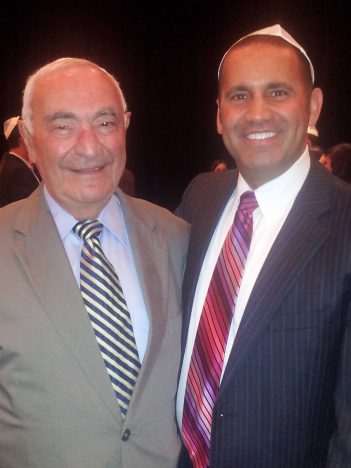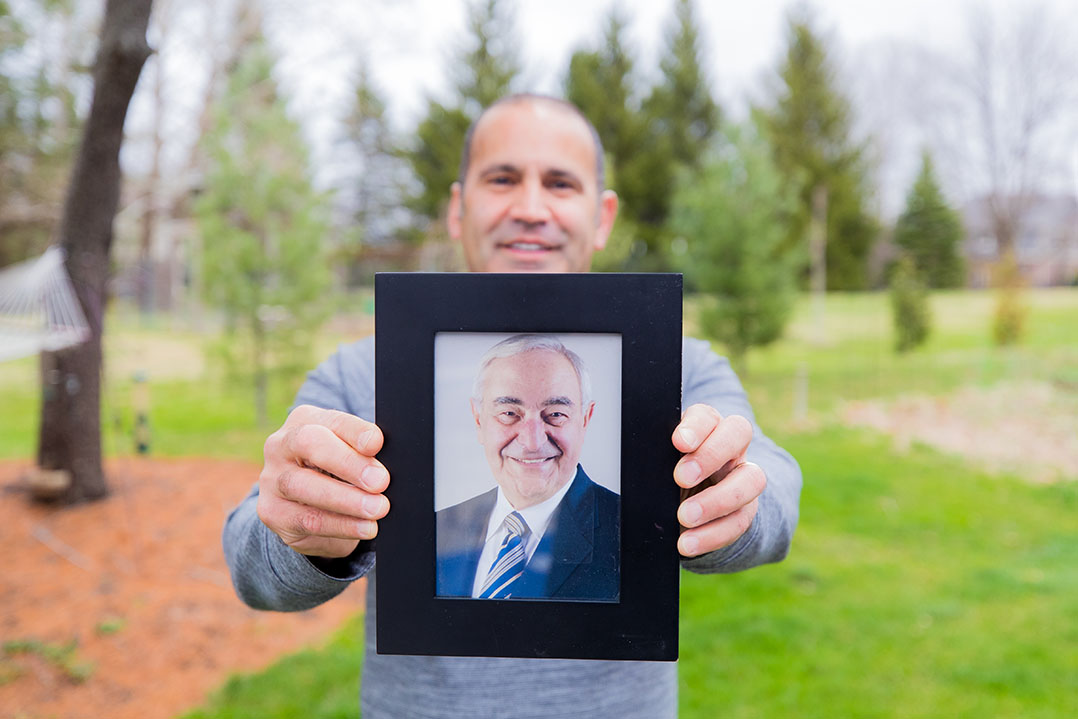By Chris Bavender
Marvin Crell lived the American dream.
That’s what Steve Crell would want people to know about his father, who died in 2020 at age 88.
“You can arrive in this country with little to nothing, not even speak the language, and you can prosper and give back to your community,” Steve said.
The Fishers resident also wants people to know his father was a resilient man. He survived the Holocaust, enduring four years in a concentration camp, but never once dwelled on his past.
“Through resilience, he put his past behind him and went on to become a productive member of society who held no bitterness, but took inspiration from hard work,” Steve said.
Marvin was born in Poland and grew up in a town called Khotyn. Today, that city is in Ukraine. During World War II, it was a large Jewish community on the border. Marvin was 8 when the war started.
As the war progressed, families in his town were forced by the Nazis to take what they could carry and were marched to a concentration camp. Each day, they walked 10 to 20 miles, Marvin recounted in an interview in 1990 with the Fort Wayne Jewish Federation as part of a project documenting the testimonies of Holocaust survivors residing in the Fort Wayne area. The United States Holocaust Memorial Museum received a copy of the interview in May 1991.
It took three months to get to the concentration camp in Ukraine, where the villagers were forced to live in a warehouse with numerous other families, sleeping on a cold, hard floor on straw mats.
“He talked about how resourceful he and his brother had to be in order to survive. He talked about the importance of staying healthy to avoid being killed,” Steve said. “He talked about burying bodies of those who were too weak or too sick to work. It is incredible that his entire family made it out alive.”

But Marvin didn’t like to talk too much about his time in the concentration camp. When Steve or his brother, Jeff, would ask what it was like, he was vague. He had only a few photos from childhood to share with his sons.
“I’m sure he didn’t want us to think of him in such dire surroundings and didn’t want us to dwell on what he experienced,” Steve said. “Rather than being proud of his survival, I think he felt guilt over those who didn’t survive. He really didn’t want to recount his prior life, in photos or otherwise.”
After four years, Marvin and his family were liberated. They went to Romania and then to Paris awaiting a chance to move to the U.S. Eventually, the family arrived in the U.S. and settled in Fort Wayne.
Steve’s cousin, Charles Bosin, remembers meeting Marvin for the first time at a family gathering.
“I had been told by my future mother-in law stories about how they had first met after the family had resettled in America,” Bosin said. “I was not surprised by her first impressions of trying to comprehend the hell that these people had encountered.”
Marvin lost his childhood in the camp, Bosin said.
“To survive, he had to have reached into his most inner self to find a way to cope with a world that was crashing around him – often on an hourly basis,” Bosin said. “I did not ask many questions out of respect. Members of my own family had similar experiences. My great-grandmother was starved in a ghetto in Kishinev, Romania, and died while on a death march.”
It was difficult to hear what Holocaust survivors like Marvin lived through, Bosin said.
“At a certain point, you just knew to let them have some peace and try to live a normal life again,” he said. “Marvin had a wonderful outlook on life, highly optimistic and often remarked that he was grateful for the life he was able to build for himself and his immediate family.”
And it is that optimism and bright outlook on life that Steve remembers most about his father.
“Despite his horrible experiences, my dad was a very happy and generous person throughout his adult life,” Steve said. “He became a very successful attorney, but he always preached about keeping a low profile, staying humble and always giving the next generation a chance to succeed and fulfill their dreams, as he got to do when he arrived here. He never once dwelled on his past. By the same token, he never wanted to go back to visit his homeland, even though he could have. I did attend a World Holocaust Memorial Reunion in Israel in 1980, where I saw my dad break down in tears as he recited prayers for those that died in the Holocaust. There is no question all of those memories had surfaced for him there, but he didn’t seem to bring that back home with him.”
Steve paid tribute to his father in a blog for the City of Fishers Jan. 27 on Holocaust Remembrance Day, an annual day of remembering and honoring those who perished and those who survived the Holocaust. This month, during Holocaust Remembrance Month, Steve is again reflecting on his father’s life and legacy.
“My dad and his family lived through unspeakable horrors, yet somehow they all survived,” he said. “I think an experience like that created an unbreakable bond and taught them the value of family and life itself. I think my dad and his family celebrated every day like it was a gift and they taught the same values to my brother Jeff and me with our frequent and consistent family meals and celebrations.”
Holocaust resources
To hear more about Marvin Crell’s experience during the Holocaust, listen to his interview on the Holocaust Memorial Museum site at collections.ushmm.org/search/catalog/irn512643.
To read Steve Crell’s Holocaust Remembrance Day blog about his father, visit thisisfishers.com/national-holocaust-remembrance-day-thoughts-from-a-survivors-son/.
To learn more about the Holocaust and hear other survivor’s stories, visit the Holocaust Memorial Museum at ushmm.org.
In 1995, Holocaust survivor Eva Mozes Kor opened the CANDLES Holocaust Museum and Education Center in Terre Haute, with a mission to prevent prejudice and hatred through education about the Holocaust. The museum features an interactive exhibit, called Dimensions in Testimony, where visitors can hear from numerous survivors as they answered as many as 2,000 questions about life before, during and after their experience during the genocide.



